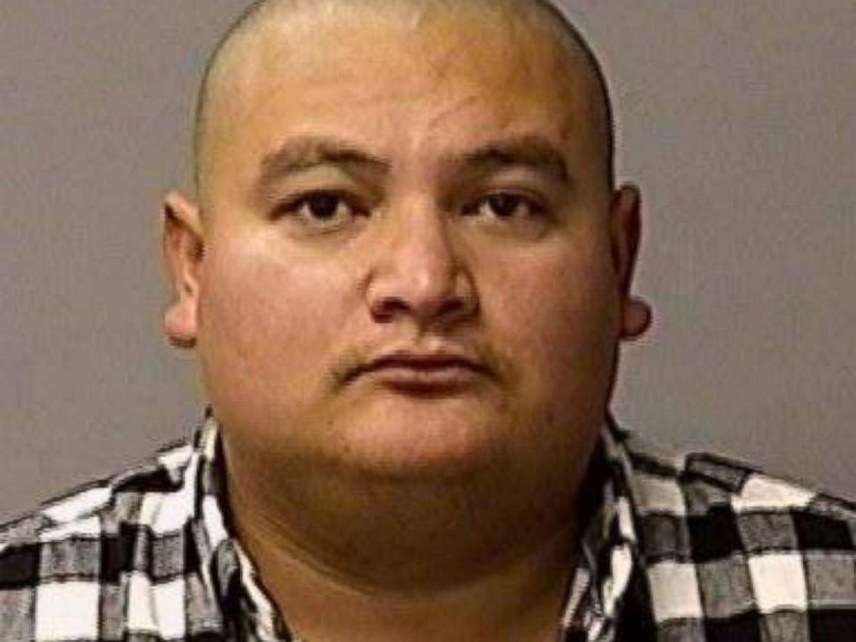Sanctuary Cities Aren't to Blame for Killing of California Cop
The suspect's previous DUI arrests didn't even put him on ICE's radar.

Gustavo Perez Arriaga, 32, an immigrant from Mexico living illegally in California, has been charged with homicide for shooting and killing a police officer during a traffic stop. This has prompted yet more debate over the state's sanctuary laws. But it's increasingly clear that those sanctuary rules aren't to blame.
Newman, California, Police Cpl. Ronil Singh pulled over Arriaga last Wednesday for suspicion of drunken driving. Arriaga is accused of shooting Singh and fleeing. He was arrested on Friday near Bakersfield following a statewide manhunt, apparently while attempting to flee back to Mexico. Seven others, including Arriaga's brother, were arrested for allegedly attempting to help him evade the police.
As this story played out, critics immediately attempted to blame California's status as a "sanctuary state," where law enforcement agencies face restrictions in cooperating or passing along information to federal immigration officials about a person's residency status. The sheriff of Stanislaus County, Adam Christianson, a Republican who embraces Donald Trump's attitudes toward immigration, held a press conference to point the finger at the state's sanctuary laws. Arriaga had previously been arrested for driving under the influence, and the implication where was that sanctuary laws somehow prevented police from communicating to Immigration and Customs Enforcement (ICE) that Arriaga was some sort of threat or danger.
But there are a lot of problems with that claim. First of all, SB 54, the legislation that made California a "sanctuary state," passed in 2017 and was implemented only this year. Arriaga's previous arrests happened in 2014 in Chowchilla in Madera County. Prior to the passage of SB 54, some California cities and counties had their own sanctuary rules restricting police from passing along information about a person's immigration status except for serious crimes. But neither Madera County nor Chowchilla was among them. Indeed, Madera County officials have been accused of attempting to craft secret policies to cooperate with ICE to hand over illegal immigrants when they get detained. Not exactly what one would describe as a "sanctuary."
What seems to have actually happened is that police never asked Arriaga about his immigration status when he was arrested and charged with those previous DUIs, according to Chowchilla Police Chief David Riviere. Officials from ICE confirmed over the weekend that they had never requested that Arriaga be held for possible deportation because they had never had any encounters with him.
Sanctuary cities had nothing to do with why Arriaga was still in the United States. The reality was that he was arrested for a common crime—drunken driving—that may be a problem but was not an indication that Arriaga was violent. Now the coverage is talking about his potential gang ties, but there's still no sign of a violent history.
This attempt to make sanctuary cities the villains resembles President Trump's recent advertisement attempting to blame Democratic immigration policies for a cop-killer named Luis Bracamontes. In that case, it turned out that it was the office of then–Sheriff Joe Arpaio, a notorious border hawk, in Maricopa County, Arizona, that released the guy from custody following a drug arrest in 1998.
That doesn't mean Arpaio is responsible for Bracamontes' killings any more than sanctuary cities are responsible for what Arriaga is charged with. But it does show that even when you look closely at the most extreme cases of illegal immigrants committing violent crimes, it's difficult to find a policy silver bullet.
Sanctuary cities don't foster crime. If anything, they create an environment where immigrants are more comfortable turning to law enforcement to talk to them about crimes. Immigrant communities, even those with people in the country here illegally, are not incubators of criminal activity.
Related: ReasonTV's Zach Weissmueller explored what conservatives and restrictionists get wrong about immigration when it was a big campaign issue in the 2016 election. Watch below:


Show Comments (38)